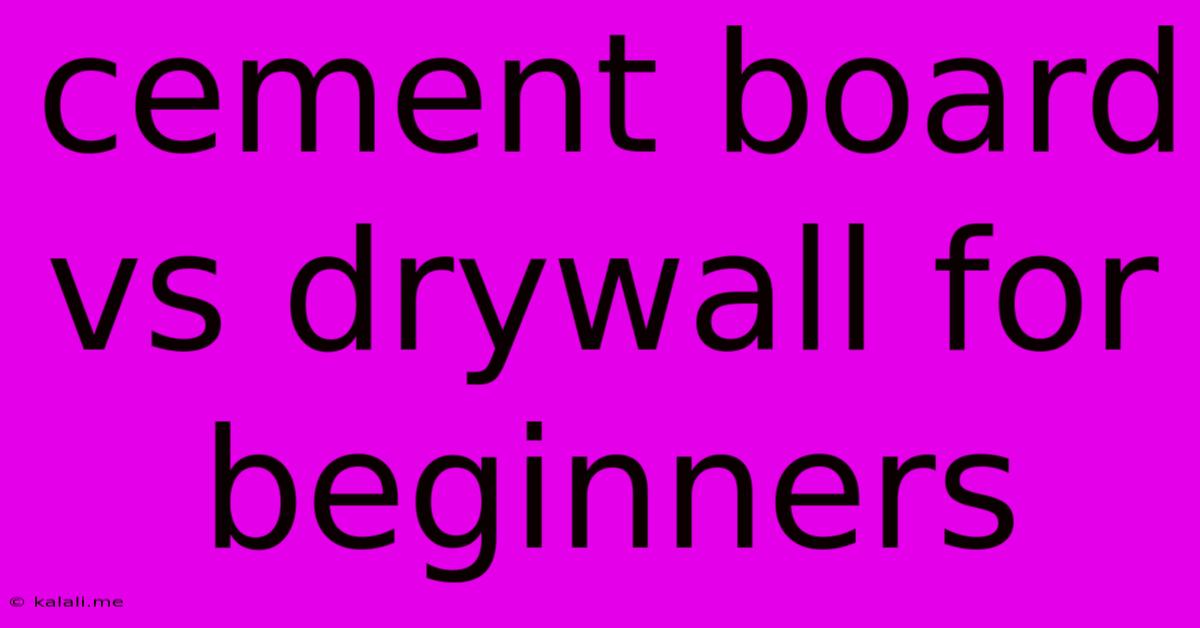Cement Board Vs Drywall For Beginners
Kalali
Jun 06, 2025 · 3 min read

Table of Contents
Cement Board vs. Drywall: A Beginner's Guide to Choosing the Right Material
Choosing between cement board and drywall can feel overwhelming, especially for beginners tackling home improvement projects. Both are common wall and ceiling coverings, but their properties and applications differ significantly. This guide will break down the key distinctions to help you make the informed choice for your specific needs. Understanding the pros and cons of each will ensure a successful and long-lasting project.
What is Drywall?
Drywall, also known as gypsum board or plasterboard, is a common interior building material. It's lightweight, easy to install, and relatively inexpensive. Drywall consists of a gypsum core sandwiched between two layers of paper. Its ease of use makes it a popular choice for many DIY projects.
What is Cement Board?
Cement board, also known as backer board, is a much more durable alternative. Made from a mixture of cement, sand, and cellulose fibers, it’s significantly denser and more resistant to moisture, impact, and fire than drywall. This makes it ideal for areas prone to dampness or requiring extra protection.
Key Differences: A Head-to-Head Comparison
| Feature | Drywall | Cement Board |
|---|---|---|
| Cost | Less expensive | More expensive |
| Weight | Lightweight | Heavy |
| Moisture Resistance | Low | High |
| Durability | Susceptible to damage; easily dented | Very durable; resists impact and moisture |
| Fire Resistance | Moderate | High |
| Installation | Easier | More difficult; requires specialized tools |
| Ideal Use Cases | Interior walls and ceilings in dry areas | Bathrooms, kitchens, exterior walls, areas prone to moisture |
When to Choose Drywall:
- Budget-friendly projects: Drywall is the more economical option for general interior wall and ceiling applications.
- Standard interior walls: In dry, interior spaces where moisture isn't a concern, drywall provides a smooth, paintable surface.
- Ease of installation: Its lightweight nature and simple installation process make it a DIY-friendly choice.
When to Choose Cement Board:
- Wet areas: Bathrooms, kitchens, laundry rooms—anywhere prone to moisture or splashing—benefit greatly from cement board's superior moisture resistance. This helps prevent mold and mildew growth.
- Areas requiring impact resistance: Cement board provides superior protection against impacts and scratches, making it ideal for high-traffic areas or areas with potential for accidental damage.
- Exterior applications: In some instances, cement board can even be used as a substrate for exterior siding.
- Fire-rated applications: Its high fire resistance adds an extra layer of safety.
Installation Considerations:
Drywall installation is relatively straightforward and requires basic tools. Cement board, however, is heavier and requires specialized tools like a wet saw for cutting and appropriate fasteners. Always consult detailed installation guides for both materials to ensure proper application and prevent future issues.
Beyond the Basics: Other Factors to Consider
- Finishing: Both materials require finishing before painting. Drywall requires taping and mudding to create a smooth surface, while cement board may require additional sealing or priming before painting.
- Thickness: Both drywall and cement board come in various thicknesses, affecting their strength and stiffness.
- Accessibility: Consider your access to the work area. Cement board's weight might make it challenging to handle in tight spaces.
Conclusion:
The best choice between cement board and drywall hinges on your project's specific requirements. For most standard interior walls in dry areas, drywall's affordability and ease of installation are compelling advantages. However, when facing moisture, impact, or fire concerns, the superior durability and protective properties of cement board make it the superior option despite the increased cost and installation complexity. By carefully weighing these factors, you can confidently select the appropriate material for a successful and long-lasting project.
Latest Posts
Latest Posts
-
How To Check My Own Conv2d Backwards Is Correct
Jun 07, 2025
-
Whats A Negative Divided By A Negative
Jun 07, 2025
-
How Big Will An Olive Tree Grow
Jun 07, 2025
-
Can You Drink The Water In Dominican Republic
Jun 07, 2025
-
Mac Fix Or Merge Mp4 Files
Jun 07, 2025
Related Post
Thank you for visiting our website which covers about Cement Board Vs Drywall For Beginners . We hope the information provided has been useful to you. Feel free to contact us if you have any questions or need further assistance. See you next time and don't miss to bookmark.